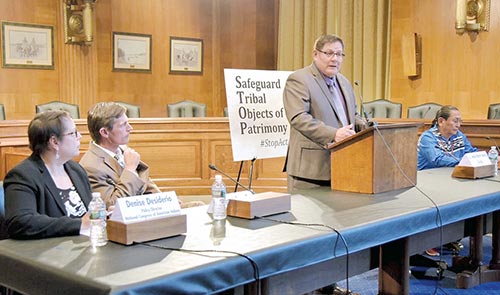
Bill aims to STOP theft of religious items

Submitted Navajo Nation Tribal Council Speaker LoRenzo Bates, presenting at a press conference in Washington D.C. says that the STOP Act will help protect cultural items from being trafficked to overseas auction houses.

Submitted
Navajo Nation Tribal Council Speaker LoRenzo Bates, presenting at a press conference in Washington D.C. says that the STOP Act will help protect cultural items from being trafficked to overseas auction houses.
ALBUQUERQUE
Yeibichei masks are never supposed to leave tribal lands. But, ending up in the wrong hands, there have been incidents when they’ve been taken thousands of miles away to overseas destinations to be sold to the highest bidder.
When that’s happened, LoRenzo Bates Navajo Nation Council Speaker, (T’iistoh, Sikaad, Nenahnezad, Upper Fruitland, Tse’ Daa’ Kaan, Newcomb, San Juan) stated during a recent press conference, the Nation doesn’t stop until the sacred items are safely back home.
“Because of the significant value in terms of our culture, it’s important that the Nation take action. We did it once, thinking that maybe it would end at that time,” but he continued, it didn’t and the Nation once again had to expend a great deal of energy and resources.
Bates brought attention to the struggle to find and bring home the tribe’s cultural property during a July 6 press conference in Washington, D.C. hosted by U.S. Sen. Martin Heinrich (D-N.M.).
The press conference, which was webcast on YouTube, unveiled the Safeguard Tribal Objects Patrimony (STOP) Act, a federal bill recently introduced by Heinrich that aims to end the theft and trafficking of Native American cultural items.
According to Denise Desiderio, the policy director for the National Congress of American Indians, religious items like Yeibichei masks have been taken from tribal communities for a long time. Appearing with Bates, Desiderio recalled the 1940s when assimilation efforts included robbing tribes of cultural items.
“The removal, theft and trafficking of Native American cultural items persists today and continues to be harmful to our communities. Each item that’s removed has a place within the tribe and is vital to teaching future generations about who we are and where we come from,” she stressed.
In 2014, Hopi masks were gaveled off at the EVE Auction house in Paris, France according to a story in the L.A. Times, which also reported that it had been the third (known) time Native American religious items had been sold at auction in the previous 15 months.
To read the full article, pick up your copy of the Navajo Times at your nearest newsstand Thursday mornings!
Are you a digital subscriber? Read the most recent three weeks of stories by logging in to your online account.







 Highway 264,
Highway 264, I-40, WB @ Winslow
I-40, WB @ Winslow